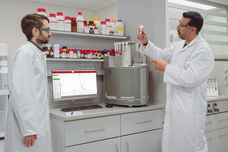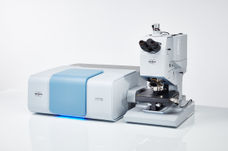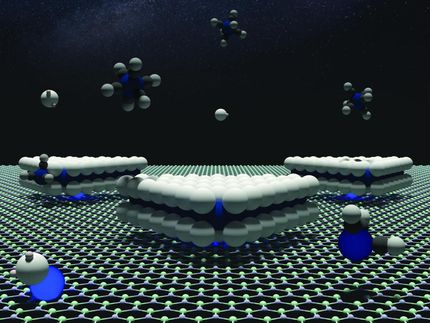Molecular sponge for the electronics of the future
The properties of the new 2D polymer can be controlled in a targeted and reversible manner
An international research team led by Dr Florian Auras from Dresden University of Technology (TUD) has succeeded in developing a new type of material in the rather young research field of covalent organic frameworks. The new two-dimensional polymer is characterised by the fact that its properties can be controlled in a targeted and reversible manner. This has brought the researchers a step closer to the goal of realising switchable quantum states. These results were recently published in the journal 'Nature Chemistry'.
Porous covalent organic frameworks (COFs) are a class of highly ordered, porous materials consisting of organic molecules that are linked by covalent bonds to form a network. They enable the construction of functional materials with molecular precision. Similar to metal organic frameworks (MOFs), which were discovered around 25 years ago and have already reached market maturity, COFs possess highly promising structural, optical and electronic properties for numerous applications, for example in gas and liquid storage, catalysis, sensor technology and energy applications.
Previous research on COFs has generally focussed on the construction of rigid frameworks with static material properties. Dr Florian Auras and his team at the Chair of Molecular Functional Materials at TUD have now developed a design strategy for dynamic two-dimensional COFs that can open and close their pores in a controlled manner, similar to a sponge. "The main aim of the study was to equip these frameworks, which are normally very precisely ordered but rigid, with exactly the right degree of flexibility so that their structure can be switched from compact to porous. By adding solvent to the molecular sponge, we can now temporarily and reversibly change the local geometry as well as optical properties such as colour or fluorescence," says Florian Auras, explaining his research approach.
The ability to switch the structural and optoelectronic properties of the materials back and forth in a targeted manner makes the materials particularly interesting for future applications in electronics and information technology. "Our research results form the basis for our further research into stimuli-responsive polymers, particularly with the aim of realising switchable quantum states. When working on COFs, I am always fascinated by how precisely their properties can be manipulated by controlling the molecular structure," adds Auras.
Original publication
Most read news
Original publication
Florian Auras, Laura Ascherl, Volodymyr Bon, Simon M. Vornholt, Simon Krause, Markus Döblinger, Derya Bessinger, Stephan Reuter, Karena W. Chapman, Stefan Kaskel, Richard H. Friend, Thomas Bein; "Dynamic two-dimensional covalent organic frameworks"; Nature Chemistry, 2024-5-3
Topics
Organizations
Other news from the department science
These products might interest you

Eclipse by Wyatt Technology
FFF-MALS system for separation and characterization of macromolecules and nanoparticles
The latest and most innovative FFF system designed for highest usability, robustness and data quality

Spinsolve Benchtop NMR by Magritek
Spinsolve Benchtop NMR
Spinsolve is a revolutionary multinuclear NMR spectrometer that provides the best performance

HYPERION II by Bruker
FT-IR and IR laser imaging (QCL) microscope for research and development
Analyze macroscopic samples with microscopic resolution (5 µm) in seconds

Get the chemical industry in your inbox
By submitting this form you agree that LUMITOS AG will send you the newsletter(s) selected above by email. Your data will not be passed on to third parties. Your data will be stored and processed in accordance with our data protection regulations. LUMITOS may contact you by email for the purpose of advertising or market and opinion surveys. You can revoke your consent at any time without giving reasons to LUMITOS AG, Ernst-Augustin-Str. 2, 12489 Berlin, Germany or by e-mail at revoke@lumitos.com with effect for the future. In addition, each email contains a link to unsubscribe from the corresponding newsletter.





























































